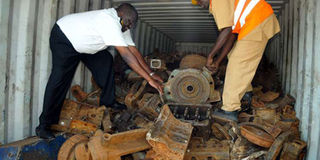Battery firm wants scrap metal law effected

Kenya Revenue Authority Senior Assistant Commissioner Enforcement Port Operations officer Benson Kisilu (left) and a port worker verify scrap metals in one of the four 20ft containers at the port of Mombasa. The four containers were loaded with scrap metals worth Sh12 million ready for export to China. PHOTO | FILE | NATION MEDIA GROUP
What you need to know:
- Associated Battery Manufacturers deals in automotive and solar power batteries across the East African region.
- Unscrupulous dealers export secondary lead to India and China owing to its high demand in the international market.
- Kenyan battery manufacturers have a monthly capacity of 100,000 batteries to supply the EAC market estimated at 200,000 a month.
Battery manufacturers have asked the Industrialisation ministry to urgently operationalise the Scrap Metal Act 2015 to protect local raw materials from being exported by unscrupulous metal traders.
The industry players said the delay in implementing the Act, enacted in January 2015 has exposed raw materials for local industries to illegal exports.
“Unscrupulous scrap metal traders continue to deny manufacturers access to the material through illegally exporting scrap metal particularly lead.
The industry estimates that Kenya losses 100 tonnes of lead to these illegal exporters every week,” Mr Guy Jack, the Associated Battery Manufacturers (ABM) group chief executive officer said.
ABM deals in automotive and solar power batteries manufacturing across the East African region and derives its raw materials from the local market.
Mr Guy said unscrupulous dealers were exporting secondary lead particularly to India and China owing to its high demand in the international market, denying local manufacturers raw materials.
ENVIRONMENTAL SAFEGUARDS
“Unscrupulous scrap metal dealers in Kenya have wreaked havoc to the industry. Local and international environmental safeguards continue to be violated, in the handling of this volatile and highly toxic metal as illegal exports disguised as elevator counter weights and oxide for paints runs unchecked,” Mr Guy said in a statement.
Industry players estimate the country is losing 100 tonnes of lead to the illegal exporters every week. This is despite the Kenyan battery manufacturers having a monthly capacity of 100,000 batteries to supply the EAC market which is estimated at 200,000 a month.
“The shortfall is imported, creating an estimated $17 million in foreign exchange outflow monthly,” said Mr Guy. He warned that if the trend continues, jobs of thousands of Kenyans were on the line.
In 2012 there was a protracted push by the East African Community for a complete export ban of used/scrap lead batteries, lead scrap, crude lead or refined lead from the common market.





